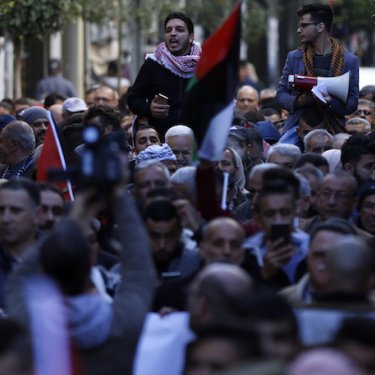Palestinian political rivalry takes toll on journalists

As Palestinian journalists continue to be the targets of a month-old wave of arrests and intimidation in the Gaza Strip and West Bank, Reporters Without Borders (RSF) calls on Hamas in Gaza and the Fatah-led Palestinian Authority in the West Bank not to turn journalists into the collateral victims of their rivalry.
At least six journalists have been arrested since the end of December in the West Bank, which is ruled by Fatah leader Mahmoud Abbas, the Palestinian Authority’s president. One of them is still held, Quds Press agency journalist Youssef Fiqqi, who was arrested on 16 January, respectively.
The other five were Quds Press agency journalist Zaid Abu Ara, who was held from 31 December to 17 January, Moatasem Saqf al Hit, the correspondent of the Quds al Akhbariya network (QudsN), who was held from 30 December to 6 January; Najah TV’s Hazem Nassar, who was held from 12 to 14 January; Mahmoud Harish, a freelance photographer, who was held from 7 to 28 January, and Najah TV’s Omari Istita, who was arrested on 22 January and released the same day.
In the Hamas-controlled Gaza Strip, journalists are being subjected to harassment with the aim of silencing them. The Hadaf online newspaper’s correspondent, Hoda Baroud, was summoned for questioning by security officials on 5 January over a story about incest. Maysoon Kohli, a columnist for the Donia al Watan online newspaper who often writes about bad governance, reported that her brother had been summoned for questioning with the aim of intimidating her.
Photographer and video reporter Hajar Harb is being subjected to indirect pressure in an attempt to get her to abandon her seven-month-old investigations into alleged corruption in the allocation of funds for rebuilding destroyed homes. She was already prosecuted for her earlier investigative reporting on corruption in the health system.
As the hostility between Hamas and Fatah-led Palestinian Authority has surged of late amid growing concerns within each about their hold on power, journalists have been harassed or threatened for allegedly undermining the ruling party in the territory where they are based by highlighting its flaws, or because of the affiliation – real or suspected – of the media they work for.
“It’s not the job of journalists to act as the propaganda tool of this or that party and they must not be the collateral victims of the political rivalries between the Palestinian leaders,” said Sophie Anmuth, the head of RSF’s Middle East desk. “Journalists must be free to investigate and cover all stories from any angle they choose. We call for the immediate release of the detained journalists and an end to the harassment.”
As well as being the frequent victims of disputes between the Palestinian leaders, Palestinian journalists are also exposed to violence and abuses by Israeli soldiers in both the Gaza Strip and the West Bank. The Palestinian Territories are ranked 135th out of 180 countries in RSF’s 2018 World Press Freedom Index.



